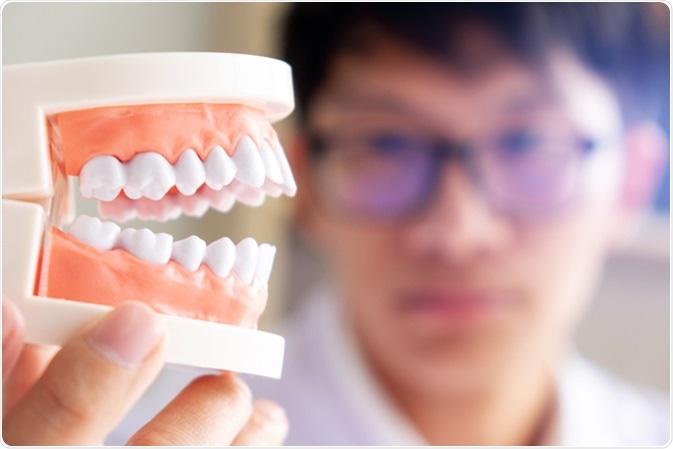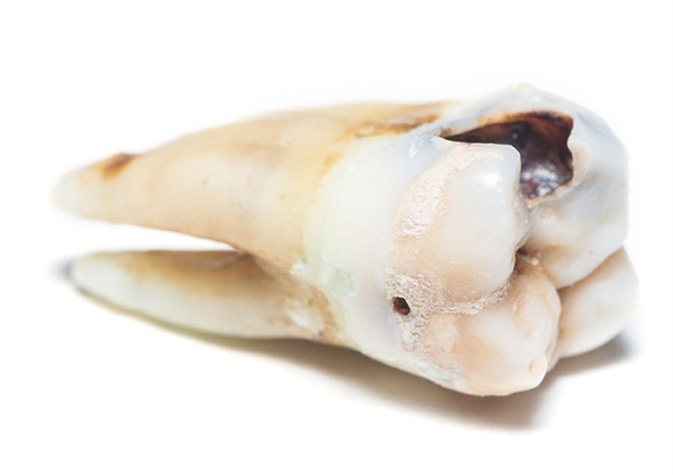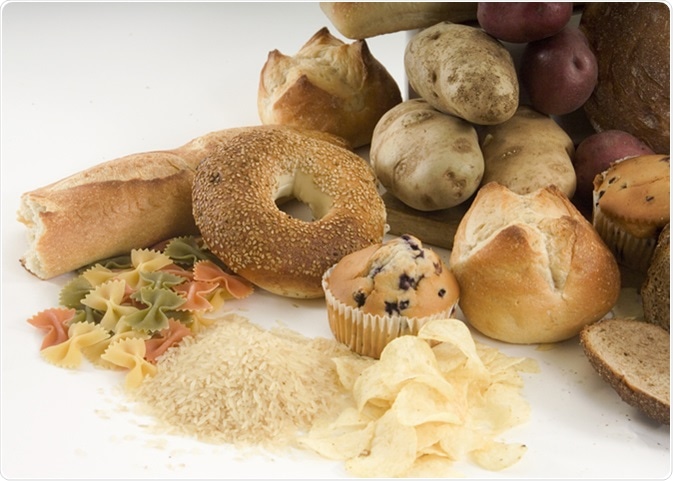Food plays an important role in maintaining good oral health. However, certain foods and drinks can severely affect oral health.
As humans have evolved, dietary trends may have shifted from raw and fibrous foods to more processed and refined foods, leading to dental complications such as tooth decay and misalignment of teeth.

Dentist with teeth model. Image Credit: mojo cp/ Shutterstock
How Does Food Affect a Healthy Oral Environment?
Good oral health is dependent on various factors. The kind of food consumed contributes to the pH of the oral cavity.
In general, a less acidic environment prevents tooth damage and minimizes the chances of tooth demineralization.
Certain foods contribute to lowering the pH of the mouth, thereby making the oral environment more acidic. It is observed that when the pH level is less than 7.0, it creates an oxygen-scarce environment leading to dental decay.
Post-consumption of sugary foods/drinks, acids are released by bacteria as they feed upon these foods. These acids produced by these bacteria interact with the plaque on the tooth surface which results in tooth caries (cavities).

Tooth decay. Image Credit: phichak / Shutterstock
Foods and their Effects on Oral Health
Citrus foods and their effect: Some citrus foods such as lemon and apple cider vinegar may pose a threat to dental health in excess.
These foods release high amounts of acids which accelerate the rate of tooth decay. These foods basically attack the enamel causing loss of calcium and phosphate ions, thereby accelerating the demineralization process.
Besides, citrus foods can also cause irritation to mouth sores. It is advisable to drink lots of water following the consumption of citrus foods to help dilute the acid, which could potentially damage the tooth enamel.
Caffeine: Over-consumption of drinks like coffee and tea could also endanger dental health.
Not only does the added sugar in these drinks increase the risk of dental cavities, but these drinks also cause dryness of the oral cavity. This leads to a lowered production of saliva leading to a condition known as xerostomia.
Xerostomia results in decreased salivary flow. Saliva plays a crucial role in maintaining a normal oral pH by buffering the acids produced by acidic or sugary foods, which contributes to minimizing the demineralization process.
Overconsumption of coffee or tea can also cause staining of the teeth.
It is highly recommended to drink lots of water after drinking coffee or tea, in order to neutralize their harmful effects.
Sticky Foods: Dry foods such as dried fruits are considered to be healthy choices for snacks.
Despite their undoubted nutritional benefits, they do pose a risk to dental health because of their sticky nature. Sticky foods tend to stick to the tooth surface for a longer period of time which could result in dental problems like caries.
It is advisable to rinse the mouth well with water soon after consuming such foods. A thorough rinsing washes away these sticky foods and protects the teeth.
Starchy Foods: Foods like potato chips are high in starch which can damage the tooth structure. Starchy foods are also responsible for disturbing the pH balance of the oral cavity leading to a loss of tooth structure through demineralization.

Starchy foods. Image Credit: Karen Struthers / Shutterstock
It is recommended that such foods be limited, if ingested at all. Also, following their consumption, a through rinse is recommended to remove the remnants of these foods. Flossing properly after brushing also helps to removing the starchy foods lodged in the interdental spaces.
Soft drinks: Carbonated soft drinks such as diet soda are rich in sugar content which allows plaque-forming bacteria to grow and react with the tooth surface, leading to enamel loss and subsequent tooth damage. Besides, carbonated drinks are highly acidic in nature and thus cause an overall drop in oral pH.
It is advisable to drink a cup of water after the consumption of such drinks to neutralize their harmful effects.
Sports drinks: Sports drinks are also high in sugar content. According to the American Academy of Pediatrics sports drinks might be beneficial during high strenuous physical activity; however, their frequent consumption is frowned upon in light of their numerous life-threatening metabolic effects consequent upon the hyperglycemia they produce.
The labels should always be read before purchasing these drinks, so as to select those with a low sugar content.
Further Reading
Last Updated: Jul 21, 2023